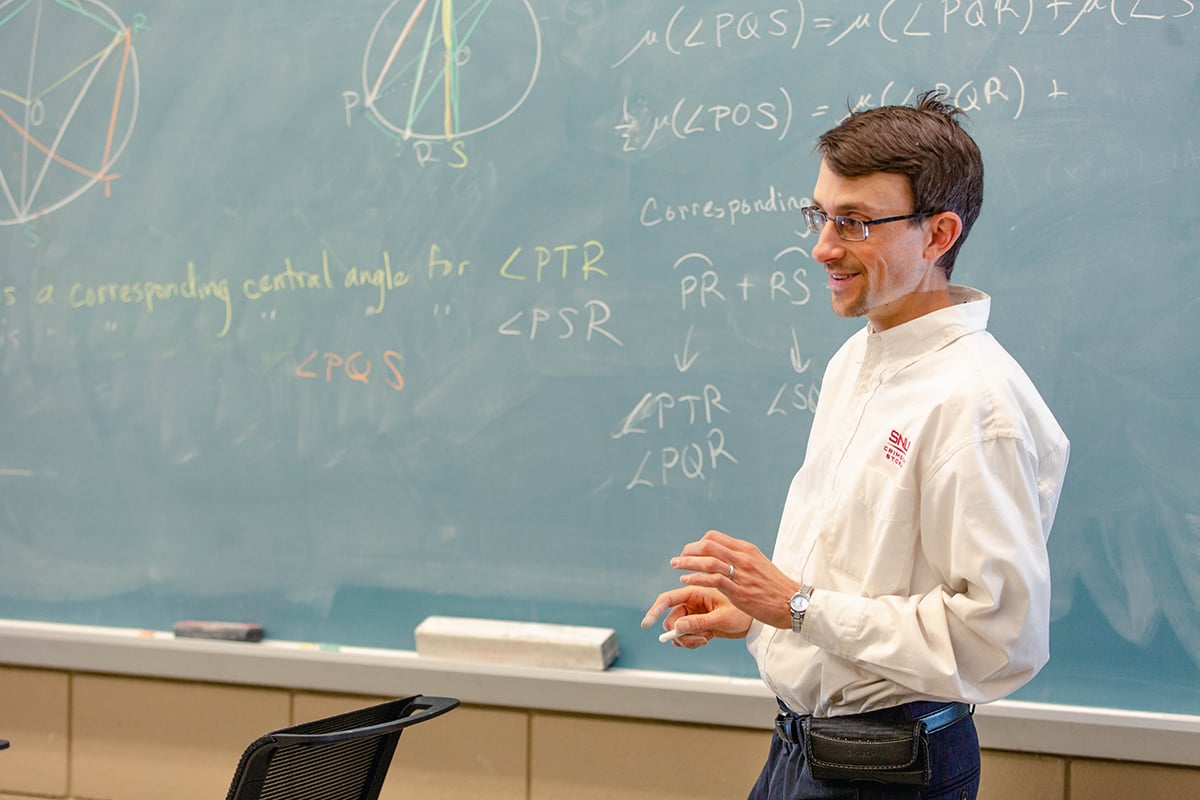The impact of qualified math teachers on student performance and confidence
Wiki Article
Everything About Qualified Math Educators: Their Role in Fostering Trainee Growth and Accomplishment in Mathematics Education
Certified mathematics educators are essential fit pupils' understanding and recognition of maths. Their deep knowledge and effective mentor strategies can considerably influence trainee outcomes. These instructors not only present mathematical abilities however likewise promote a comprehensive environment that satisfies varied finding out demands. As they adopt cutting-edge techniques, the question emerges: how do these strategies especially improve pupil involvement and achievement in mathematics?The Importance of Certified Mathematics Educators in Education And Learning
Although many factors contribute to trainee success in mathematics, the existence of certified math educators stands out as an important component in fostering efficient learning environments. Research continually indicates that trainees educated by educators with solid mathematical backgrounds have a tendency to show greater levels of understanding and accomplishment. Certified math educators not just possess a deep understanding of mathematical concepts however likewise the instructional abilities required to convey intricate ideas in obtainable means. They can recognize trainees' private requirements and adjust their training methods appropriately, promoting inclusivity and involvement. On top of that, their know-how permits them to produce a positive classroom atmosphere that urges risk-taking and resilience in analytic. This encouraging atmosphere promotes a growth mindset amongst trainees, boosting their self-confidence and inspiration in maths. Overall, certified math educators play an important role in forming trainees' attitudes toward math, ultimately affecting their future opportunities and scholastic trajectories.Trick High Qualities of Effective Math Educators
Efficient mathematics teachers have numerous crucial qualities that improve their teaching effectiveness. These consist of deep subject expertise, strong communication abilities, and flexible teaching techniques that accommodate varied discovering requirements. Recognizing and growing these qualities can considerably impact trainee understanding and involvement in maths.Deep Topic Expertise
While a strong instructional approach is necessary, deep subject expertise remains a keystone of effective math teachers. Such knowledge makes it possible for teachers to understand mathematical principles thoroughly and to anticipate student false impressions. Educators with a solid grasp of math not just provide material with self-confidence however additionally connect different topics, promoting a richer understanding setting. They are geared up to apply diverse mentor strategies that accommodate various learning designs, making intricate ideas extra easily accessible. Deep subject knowledge encourages educators to involve in purposeful conversations with students, encouraging crucial thinking and analytic skills. Inevitably, the depth of recognizing that mathematics teachers have greatly influences pupils' academic growth and accomplishment in maths, laying a strong structure for future discovering.Solid Interaction Skills
Deep subject expertise alone wants for cultivating a productive learning setting in mathematics; solid interaction skills are similarly important for reliable math instructors. These skills enable educators to communicate intricate ideas in obtainable methods, guaranteeing that trainees grasp foundational concepts. Effective interaction entails not just quality however additionally the capacity to proactively listen, urging pupil involvement and attending to misconceptions. By cultivating an open discussion, instructors produce a supportive classroom environment where trainees feel comfy asking inquiries and sharing their thoughts. Furthermore, strong communicators can adjust their language and descriptions to fit diverse learning styles, improving student involvement and comprehension. Ultimately, reliable communication bridges the gap in between an educator's knowledge and a trainee's understanding, considerably influencing scholastic accomplishment in maths.Adaptive Mentor Techniques
A selection of adaptive mentor approaches are important for efficient mathematics instructors aiming to fulfill the varied needs of their pupils. These techniques make it possible for instructors to customize their guideline based on individual learning styles, rate of interests, and capabilities. qualified math teachers. Techniques such as distinguished direction, where teachers modify material, product, or process, help address varying proficiency levels. Furthermore, including technology and interactive devices can improve interaction and facilitate customized learning experiences. Formative analyses enable teachers to keep an eye on development and adjust teaching techniques as necessary. Collaborative group work advertises peer understanding, cultivating a helpful atmosphere. By employing these adaptive techniques, mathematics educators can create comprehensive class that motivate all students to flourish and accomplish their academic objectives, eventually cultivating a love for mathematicsIngenious Training Approaches Used by Math Teachers
As teachers look for to engage pupils a lot more efficiently, innovative teaching techniques have arised as a focal factor in mathematics classrooms. These techniques intend to enhance understanding and retention of mathematical ideas. One noticeable method is the usage of technology, such as interactive software and online simulations, which permits students to picture complex issues and receive prompt feedback.Additionally, project-based knowing motivates partnership and real-world application of math concepts, promoting crucial assuming skills. Gamification, where mathematics principles are integrated into game-like settings, has likewise obtained popularity, making finding out much more satisfying and motivating for students.Moreover, differentiated guideline tailors lessons to accommodate differing skill levels, guaranteeing that all trainees can proceed at their own speed. By utilizing these cutting-edge methods, math educators develop dynamic discovering experiences, ultimately promoting higher student development and achievement in maths.Producing Inclusive Discovering Environments
Developing inclusive learning environments in mathematics education entails carrying out varied discovering approaches and fostering collaborative group tasks. These approaches accommodate the diverse demands of trainees, ensuring that everyone has the opportunity to involve and prosper. By focusing on inclusivity, mathematics teachers can grow a class atmosphere that sustains all learners.Varied Understanding Methods
While many instructors undertaking to foster inclusive knowing environments, carrying out diverse discovering techniques is vital for successfully getting to all pupils. These techniques incorporate a range of mentor methods customized to fit varying learning backgrounds, designs, and capacities. Integrating aesthetic help, manipulatives, and technology can involve pupils who may battle with traditional direction. In addition, set apart instruction allows instructors to modify analyses and tasks, making sure that every student can access the educational program at their own degree. Culturally receptive pedagogy also plays a considerable function in recognizing and valuing the diverse experiences of students, therefore enhancing their connection to the material. By utilizing these diverse learning methods, certified math instructors can develop an encouraging atmosphere where all trainees are encouraged to succeed in mathematics.Collaborative Group Activities

The Influence of Professional Mathematics Teachers on Pupil Accomplishment
The existence of qualified mathematics instructors considerably influences trainee success, as effective guideline can link spaces in understanding and promote a favorable learning atmosphere. Research indicates that pupils instructed by seasoned educators show greater degrees of effectiveness in mathematical principles compared to their peers. Certified mathematics instructors possess a deep understanding of mathematical material, enabling them to existing product in diverse methods that deal with various finding out styles. This flexibility not only enhances understanding yet likewise increases student confidence in their abilities.Moreover, qualified educators often utilize developmental evaluations to monitor pupil progress, permitting prompt treatments when necessary. Their capacity to produce interesting lessons encourages pupil involvement and advertises a development way of thinking. Consequently, the influence of qualified mathematics educators prolongs past mere scholastic efficiency; it grows a feeling of inquisitiveness and durability in pupils, eventually resulting in enhanced results in maths and a get more stronger structure for future understanding.Techniques for Involving Students in Mathematics
Engaging trainees in math needs a complex method that incorporates varied methods to record their interest and improve understanding. One efficient approach is using real-world applications, permitting trainees to see the relevance of mathematical principles in daily life. Integrating modern technology, such as interactive software and online resources, can additionally foster interaction by giving dynamic understanding experiences.Group work urges partnership, enabling trainees to pick up from one an additional and create analytical skills in a supportive atmosphere. In addition, incorporating games and hands-on activities can make discovering even more delightful and accessible.Differentiated guideline accommodates different learning designs, ensuring that all pupils can get in touch with the product. Lastly, giving prompt comments aids trainees recognize their progression and locations for improvement, promoting a development mindset. By utilizing these strategies, instructors can create an engaging math classroom that advertises student development and achievement.The Duty of Professional Development in Enhancing Math Mentor Skills
While many instructors recognize the importance of efficient teaching approaches, specialist growth plays an important role in enhancing math training skills (qualified math teachers). Constant training possibilities Recommended Reading allow teachers to remain present with instructional advancements, mathematical web content, and technological tools. Workshops and workshops give forums for educators to team up, share ideal practices, and review difficulties they encounter in the classroom.Furthermore, professional growth fosters a development attitude among teachers, motivating them to review their practices and adjust their techniques based on trainee needs. This continuous learning procedure not only boosts instructors' mathematical understanding yet additionally equips them with cutting-edge educational strategies that can cause enhanced pupil engagement and achievement.Ultimately, a structured professional advancement program can greatly affect the top quality of math education and learning, ensuring that instructors are well-prepared to influence and lead their pupils toward success in mathsOften Asked Questions
What Qualifications Are Needed to End Up Being a Mathematics Instructor?
To come to be a mathematics instructor, people normally need a bachelor's level in maths or education and learning, teaching certification, and a strong understanding of mathematical concepts. Added credentials may consist of specialized training in rearing and class management abilities.
How Do Math Educators Assess Pupil Progress in the Classroom?
Mathematics instructors examine trainee development through different approaches, including tasks, quizzes, and tests (qualified math teachers). They likewise utilize empirical analyses and student involvement to assess understanding, changing guideline based on individual and group efficiency to improve learning resultsWhat Obstacles Do Math Teachers Typically Face?
Mathematics educators generally encounter challenges such as varying trainee skill degrees, minimal resources, educational program restraints, and the demand to engage students successfully. Additionally, they frequently run into pressure to enhance standardized examination ratings and manage class habits.Exactly How Can Moms And Dads Support Their Youngster's Math Education?
Parents can sustain their child's mathematics education and learning by offering a conducive discovering environment, engaging in math-related tasks, motivating a positive perspective towards obstacles, and maintaining open interaction with educators to keep track of development and address worries.What Resources Are Readily Available for Mathematics Teachers to Enhance Their Skills?
Different sources are readily available for mathematics instructors, including on-line courses, professional advancement workshops, peer cooperation groups, educational web sites, and training journals. These tools boost training approaches, grow subject expertise, and eventually enhance student learning results in maths. Certified math teachers are necessary in shaping pupils' understanding and appreciation of maths. Several aspects add to pupil success in maths, the existence of qualified math educators stands out as an essential aspect in cultivating effective learning atmospheres. In addition, qualified mathematics educators promote these interactions by strategically organizing trainees, making sure that each group contains a mix of skill levels and histories. The existence of qualified math teachers considerably influences pupil achievement, as effective instruction can link spaces in understanding and foster a favorable knowing setting. Mathematics educators frequently encounter challenges such as varying student skill levels, limited sources, educational program constraints, and the need to involve students properly.Report this wiki page